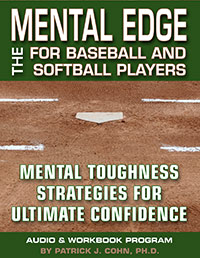Taking Control of Your Confidence
Baseball confidence is an important mental game skill for all players to learn.
Some baseball players struggle with fragile self-confidence. You have fragile baseball confidence when your confidence changes each moment depending on how you are playing in the game.
Do you have to get a hit in order to feel confident or make a good play? Or do you lose confidence after you strike out or make your first errors?
When you have fragile baseball confidence, you tend to doubt your ability when things don’t go as planned. You might question your ability to pitch a fast ball in the strike zone. Or, you might wonder if you can beat the opposing team.
Fragile self-confidence isn’t real self-confidence.
Real self-confidence is stable and doesn’t change from moment to moment depending on the game situation. When you have real baseball confidence, you aren’t questioning your ability after making mistakes or losing a game. You believe in your ability to execute the task despite previous results.
Jason Marquis, Colorado Rockies pitcher, commented on fragile self-confidence.
“When you start struggling, you doubt yourself a little bit. That’s not a good thing. You’re out on the mound not trusting your stuff, waiting for the next bad thing to happen, instead of going out there and grabbing the bull by the horns and going after them,” Jason Marquis said.
Marquis suggests that you have to take control of your confidence. This means that you are responsible for your confidence. One way to take control of your confidence is to develop your confidence from practice instead of your immediate performance.
Many baseball players gain confidence from their immediate performance such as getting a hit or making a play. Your immediate performance should not be the only way you develop confidence. You won’t always play perfectly or win every game.
If you base your confidence only on your immediate performance, you’ll be more likely to lose confidence after a poor performance. To help you develop a stable level of confidence, you’ll want to develop your confidence from years of practice and play.
Your baseball psychology tip is to base confidence on long-term success, not immediate results in a game.
For example, you should base confidence on your practice and preparation instead and years of experience in baseball.
Related Sports Psychology Articles
- How to Build Steadfast Self-Confidence as a Ball Player
- Embrace the SELF in Self-Confidence
- Self-Confidence and Taking Risks in Baseball
*Subscribe to The Sports Psychology Podcast on iTunes
*Subscribe to The Sports Psychology Podcast on Spotify
Get The Mental Edge for Baseball and Softball
If you have trouble taking your practice game to competition and under perform in games, your mental game might be the culprit! Baseball and softball players contact me everyday wanting to know why they become scared, anxious, afraid to make mistakes, and lack trust in their skills during games…
You might have a ton of physical talent and perform great in practice, but if you can’t get the job done when it counts, something is missing and the problem is an inferior mental game–not talent or motivation.
We’ve spent the last six months developing a program to teach you how to improve your mental game in 8 easy-to-apply lessons–the same TOP lessons that I teach to baseball and softball players everyday in my one-on-one mental coaching program!



Hi im a 13 year old playing baseball and every year i don’t do well or don’t do the things i wish i could do. I have practiced everyday over the off season and i still am not as good as i wish. And as you can expect i’m doubting my abilities. I have never been an over confident or cocky person, i’m very humble and modest. I constantly hear sayings like think positive but still ill strike out or pop out and ill get down on my self again. so I guess i have a fragile self confidence problem here. I love the game to death and i want to be good at it also and i don’t understand why if i’m practicing this much why i am still doing below my expectations. I practice hard and play hard and all i need is my confidence. If someone can help me that would be nice.
Paul:
Part of the problem is that you try too hard being humble and modest, which can sometimes stifle your self-confidence.
Patrick Cohn
Hello Im 13 years old and i have not had a season yet where i have played at the level that i wish i could perform at. Sometimes i am in the feild and i am afraid to make a play because i am afraid i will make a error. Sometimes i am in the field expecting bad things to happen and I think this is affecting the way I play. Can someone please help me.
I’m 18 and I’m pretty confident at the plate and even though I have been playing middle infield all my life and I do phenomonal in practice, I am still struggling fielding in games where I panic.
My Mom has always preached being confident but not cocky but I wish I knew how to do that.
Two areas you have to focus on: (1) proactive confidence based on your past success and (2) coping with the confidence killers, such as doubt and high expectations.
I can hit a baseball fine at my house, but when I get to the practice field I can’t hit to save my own life. My mechanics are the same in both areas, I just can’t hit whatsoever.
I’m 16 years old and I’ve been playing baseball my whole life. Up until this first varsity season I have had a starting position. I had so much confidence that I could field or hit any ball. The moment I found out I didn’t start I lost all that confidence. I work my ass off everyday, but the one thing holding me back is me. My dad tells me when I get over this it will make me that much better of a player, but I don’t know how to get over it. I doubt myself and hesitate and I wish I had a solution, but I’m not in a the right mindset. It’s at the point where I’m not having fun playing the game anymore. I love this game so much and I don’t want this to define my carrier.
How is your mental game changing? Are you trying too hard? Do you worry about what your teammates think?
Confidence is not about a starting position. Rather confidence comes from years or practice and play, and the belief that you have the skills to play well. Don’t allow things NOT under your control to derail your confidence. Also, take a look at The Confident Athlete CD program at Peaksports.com.
My grandson is going through a fielding and hitting slump right now. The sad part is, this kid has way more athletic than most kids. His coach says he is the best player on the field in practice but he doesn’t carry this good play to the game. I don’t know what to say to him. After last nights game where he went 0-2; failed to get the runner out on a slow roller that he didn’t execute fast enough, after the game he tells us that he just sucks badly. He doesn’t suck, but he thinks he does. What do we say to him? This kid works harder than I ever worked at the game. Sometimes I think he is too obsessed with the game. But he loves it so much and takes a lot of pride in his ability. How to we restore the confidence because he has always excelled up until this year. He is 13.
He might be overthinking his game. He needs to be athletic and let it happen. You build confidence by focusing on what skills he has, not immediate results. Build a list of positive skills and traits that he can review often.